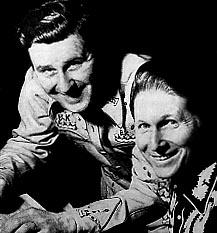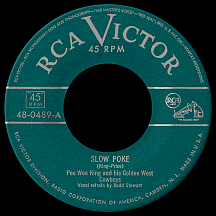PEE WEE KING
WITH REDD STEWART
Slow Poke
Well-seasoned performer, master accordionist and fiddle player Pee Wee King had more than 15 years' experience under his belt by the time his career reached its peak. His impressive body of work as leader of The Golden West Cowboys is overshadowed by his stunning success as a songwriter. Among many top-selling mid-century compositions, the most prominent is "Tennessee Waltz," penned in collaboration with his band's lead singer Redd Stewart; King's original was a country and western hit in 1948, but it was Patti Page's 1950 pop version that sold millions, later becoming the most recognizable of the state of Tennessee's several designated "official" songs. His next best-known composition is "You Belong To Me" (written with Stewart and Chilton Price, who has claimed she alone composed it), a number one hit in 1952 for Jo Stafford. Another song credited to King and Price became the most popular song recorded by King, his Cowboys and vocalist Stewart; "Slow Poke" came off as a mildly whimsical criticism of any woman prone to taking her time ('You keep me waitin' 'til it's gettin' aggravatin'...') and was a million seller in 1951.
Julius Frank Kuczynski was born in 1914 of Polish ancestry, the son of a polka musician. Taking the professional name Frankie King, he started his own band, The King's Jesters, in the early 1930s. Legend has it Gene Autry, with whom he performed for a short time around 1933, gave him the name "Pee Wee" due to his five-foot-six stature. He and the Golden West Cowboys began making regular appearances on Nashville's Grand Ole Opry in 1937, the exposure helping the band land performing parts in Goldmine in the Sky (in '38) and Rancho Grande (in '40), both starring Autry and leading to appearances in several more movies through the early '50s. Early studio work includes backing Minnie Pearl (who started each song with her signature "Howdy!" yell) on a King 78, "In the Shadow of the Pine," and "I'm Lookin' Fer a Feller" on Bullet, both in 1946. His own Bullet single, "That Cheap Look in Your Eye," with a vocal by Cowboys guitarist Jimmie Wilson, came immediately after. By 1947, King had his own radio show on WAVE in Louisville, Kentucky, which evolved into a television series that ran for several years on WAVE-TV; in the mid-'50s he hosted The Pee Wee King Show from Cleveland, broadcast nationally on ABC-TV.
Frankie's main man, Redd Stewart, had been in several Louisville bands during the '30s, joining King later in the decade. During World War II, Stewart established his songwriting sideline with Ernest Tubb's 1944 country chart topper "Soldier's Last Letter," cowritten with Tubb and credited to Sgt. Henry Stewart. A few years later he became the voice heard on Pee Wee King's biggest hits. The Frankie part of King's name was dropped as a long run on RCA Victor commenced in late 1946; "Tennessee Waltz" (based in part on Bill Monroe's 1946 hit "Kentucky Waltz") spent eight months on the C&W charts during 1948. A bouncier tune, "Tennessee Tears," appeared briefly in June '49, followed by the inevitable "Tennessee Polka." Stewart branched out for a couple of years with his own series of 78s featuring The Kentucky Colonels (a band made up primarily of moonlighting Golden West Cowboys) on Cincinnati's King Records, while continuing to lend his pleasant singing style to Pee Wee's RCA discs.

The lyrics and clip-clop "clock" shuffle of "Slow Poke" struck a chord with listeners, giving King his only number one country hit as an artist, the biggest of all 1951 C&W sellers and a major pop hit to boot. During a ten year period as Grand Ole Opry performers, Pee Wee and the Cowboys often roused the ire of old-guard Opry officials. The entire group took to wearing "Nudie suits" (flashy, uniquely-designed custom made outfits made in Hollywood by designer Nudie Cohn), a shocking spectacle by the standards of the ultra-conservative stage show, though it put King and the 'boys ahead of the trend that would be commonplace in 1950s country and western fashion. King had an electric guitarist in the group for a time and even worked drummer "Sticks" McDonald into his Opry act, a no-no in those days that got him into further hot water; as time went on he added brass musicians and guaranteed a good time for all...everyone, that is, except stodgy country music purists.
After leaving RCA in the late '50s, King made records for Todd, Top Rank, Starday and other labels before retiring from performing at the end of the following decade. It was a performing career anyone would envy: nearly four decades performing with a popular, progressive band, scoring several best-sellers along the way. Still, it's the songwriting he'll be most remembered for, as his best works have become hits for many artists: "Bonaparte's Retreat" (Kay Starr and Gene Krupa in 1950, Billy Grammer in '59 and Glen Campbell in '74), "Tennessee Waltz" (Cowboy Copas in 1948, Page, Stafford, Guy Lombardo, Les Paul and Mary Ford, The Fontane Sisters and Anita O'Day in '51, Jerry Fuller and Bobby Comstock in '59, Sam Cooke in '64, plus a 1951 parody version by Spike Jones), "You Belong To Me" (Stafford, Page and Dean Martin in 1952 and The Duprees in '62), "Bimbo," cowritten with Glen O'Dell and Rod Morris (Jim Reeves, 1954), "Changing Partners" (Page, Starr, 1954) and "Slow Poke" (Hawkshaw Hawkins, Helen O'Connell, Ralph Flanagan, Roberta Lee, Arthur Godfrey and Tiny Hill, each one competing with King's original in 1951). Think of all the royalty money!


